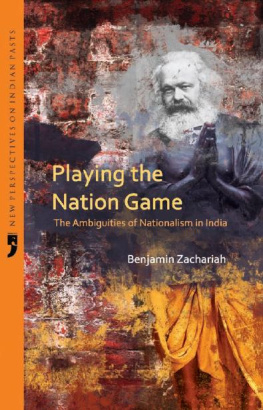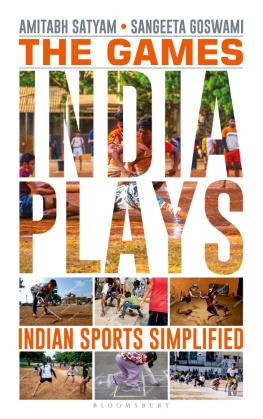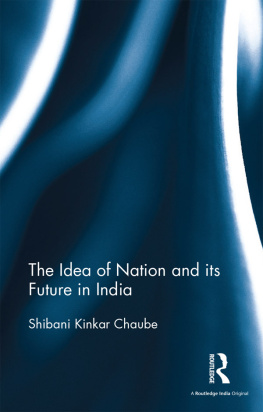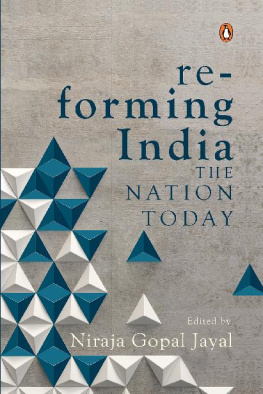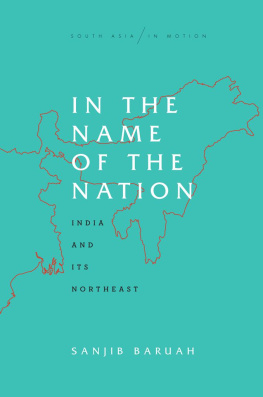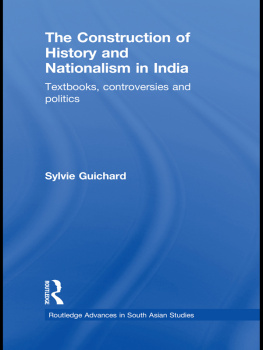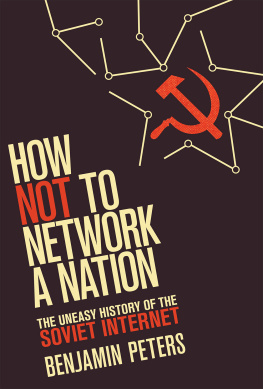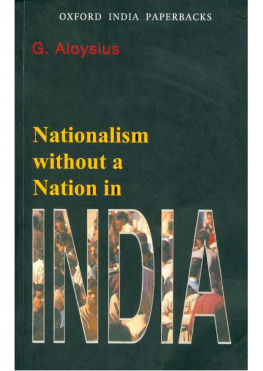Benjamin Zachariah - Nation Games: History and Historiographical Imperatives in India
Here you can read online Benjamin Zachariah - Nation Games: History and Historiographical Imperatives in India full text of the book (entire story) in english for free. Download pdf and epub, get meaning, cover and reviews about this ebook. year: 2020, publisher: De Gruyter, genre: Politics. Description of the work, (preface) as well as reviews are available. Best literature library LitArk.com created for fans of good reading and offers a wide selection of genres:
Romance novel
Science fiction
Adventure
Detective
Science
History
Home and family
Prose
Art
Politics
Computer
Non-fiction
Religion
Business
Children
Humor
Choose a favorite category and find really read worthwhile books. Enjoy immersion in the world of imagination, feel the emotions of the characters or learn something new for yourself, make an fascinating discovery.

- Book:Nation Games: History and Historiographical Imperatives in India
- Author:
- Publisher:De Gruyter
- Genre:
- Year:2020
- Rating:5 / 5
- Favourites:Add to favourites
- Your mark:
- 100
- 1
- 2
- 3
- 4
- 5
Nation Games: History and Historiographical Imperatives in India: summary, description and annotation
We offer to read an annotation, description, summary or preface (depends on what the author of the book "Nation Games: History and Historiographical Imperatives in India" wrote himself). If you haven't found the necessary information about the book — write in the comments, we will try to find it.
Nation Games: History and Historiographical Imperatives in India — read online for free the complete book (whole text) full work
Below is the text of the book, divided by pages. System saving the place of the last page read, allows you to conveniently read the book "Nation Games: History and Historiographical Imperatives in India" online for free, without having to search again every time where you left off. Put a bookmark, and you can go to the page where you finished reading at any time.
Font size:
Interval:
Bookmark:
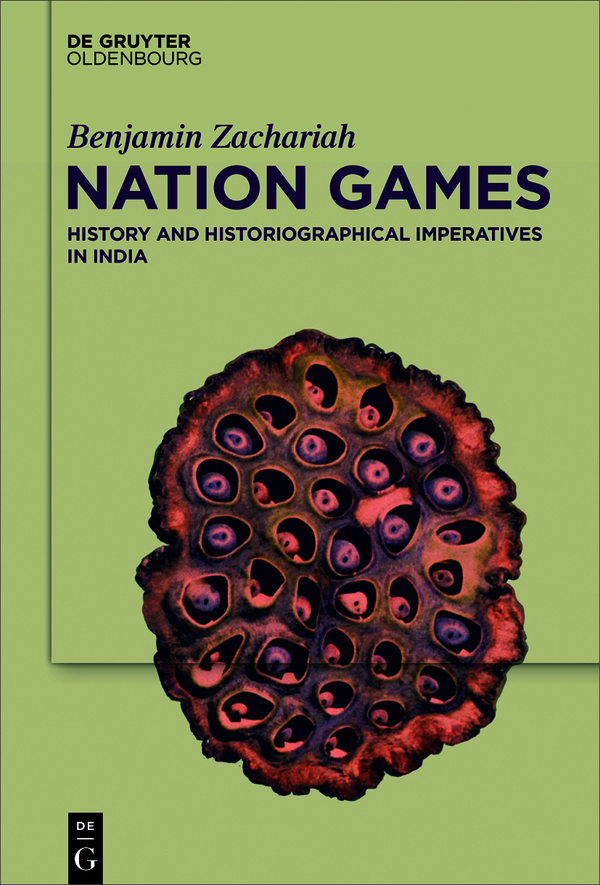
ISBN 9783110659047
e-ISBN (PDF) 9783110659412
e-ISBN (EPUB) 9783110659573
Bibliographic information published by the Deutsche Nationalbibliothek
The Deutsche Nationalbibliothek lists this publication in the Deutsche Nationalbibliografie; detailed bibliographic data are available on the Internet at http://dnb.dnb.de.
2020 Walter de Gruyter GmbH, Berlin/Boston
Nation and nationalism made their appearance in Indian political discussions in the English language between the sixth and eighth decades of the nineteenth century, gradually replacing their commonly-used predecessor term native. The legitimating potential of claiming to be a nation was not lost on an Indian political elite that was linked in to European and British, and with time North American, public debates, political theory and history. Initially the basis of a claim to a greater share in representative government, a national claim came with time to justify a claim to popular sovereignty and eventual statehood for India. The central oppositional category against which the nation was defined was alien rule or colonial rule, although attempts to harmonise an Indian nationalism with a qualified belonging to a wider British imperial polity were also present in the language of Indian political discussions.
It is important to distinguish between the words used in political language as intended legitimation, and the ideas they refer to. The question of translatability enters into the equation: Indian languages did not have equivalents that were readily adaptable to the new expression of collective identity that were far less flexible than the ones they knew, and indeed in some cases sought to impose collective belonging to the nation, than existing vocabulary allowed for. Pre-existing words referred more to fuzzy than to enumerated communities, and depending on the audience addressed, qaum, jati, rashtra etc, were used as imperfect translations that had to be naturalised, but continued to bear the connotations of their older and other usages alongside the newer ones. The nation was largely imagined, debated and theorised in English, even when written about in Indian languages: writers self-conscious referring back to English, or to other European languages via English, remains evident in most cases. A standardisation of translational practices for words in the states vocabulary had to await national independence.
Nationalism also remained a concern of an emerging all-India middle class that sought to control the economic and social spaces of the state-to-be. Among this emerging middle class, sub-groups competing for dominance in this anticipated state also contested the parameters and boundaries of belonging to the nation, attempting to exclude those they sought to disempower in an eventual state. At the same time, academic writing on an Indian nation (which was itself part of the nationalist movement), sought to buttress claims to independence and statehood, as well as to produce various versions of a nationhood, projected into the past as well as the future, serviceable for a new state. Nationalism was used to refer to a loyalty to India as a whole, used in opposition to communalism, sectional or sectarian loyalty to a usually religious identity that was less than national. Communal was seldom used as self-description, and more as attempted delegitimation.
The early years of the invocation of nationalism in the service of anti-colonial politics were based on defining the practical, spatial and cultural parameters of a nation, and watching the struggles for national unification in Italy and Germany. What should a nation do: build up its economic strength through protection of infant industries through tariffs (Friedrich List);
The principle of national self-determination was not, however, acknowledged as the central guiding principle of an emerging international state system until after the First World War, when the Bolshevik revolutionaries, Lenin and Trotsky, proclaimed it as a principle, and the US President, Woodrow Wilson At this point, what had been in the nineteenth century a radical innovation in thinking about states and sovereignty became tamed by its official anointment. The divergence between the principle and the practice remained stark. The formula of trusteeship that the League of Nations (and the United Nations thereafter) adopted to deal with not-yet-nations was a reminder that the criteria of nationhood were in the custody of outsiders with a coercive power that relied on more than concepts.
But national in India still invoked the collective that was yet to be. From the 1920s, imperial administrators as well as native intellectuals and academics spoke of nation-building, following the official British rhetoric of impending self-rule in nations ripe for self-government. The question of who belonged and who did not to an entity called India became urgent in connection with British claims that divergent and antagonistic communities could not be considered a nation and against the backdrop of communal tensions between Hindus and Muslims in particular. Nationalism thus invoked race, civilisation, and often the religious community alongside the sense of belonging to a future nation-state. It also mobilised European debates on Aryanism and eugenics in search of the healthy national body. The tautological nature of national claims that the nation and state must be congruent, therefore the state-to-be must be defined in terms of the nation that justifies it were reasonably obvious. International discourse on what a nation is and should be the standard of legitimation for the staking of claims to territorial sovereignty conspired with the idea of the one-nation-one-state model that was promoted.
Definitions came with contestations, and varieties of Indian nation had various ethnic and religious inflections. The normative importance of the national notwithstanding, it was descriptively vague. The national unit being sought was in turn Bengali (Hindu, upper caste and male), Marathi (also usually Hindu, upper-caste and male), Muslim (ashraf, North Indian, Urdu-speaking), Bengali Muslim, etc, with sectional or regional ideas of the nation simply projected onto the rest of India. The search for the essence of the nation and its national genius lent itself easily to organicist ideas of the ancient-and-modern nation that must be purged of its impurities to realise itself once again. In such
The version of nationalism that the new Indian state adopted after independence and partition was, however, a broad and inclusive one, invoking a cultural continuity with the past that went beyond sectarianism. Articulated by the left wing of a nationalist movement that saw the end of imperialist rule as an interim goal on the road to socialism, it regarded nationalism as obsolete at its very moment of realisation. or Kashmir, more or less so at different points in its post-1947 history, was often more of a contentious issue.
Post-independence India has tended to frame its arguments about national belonging more around secularism and communalism or separatism than the term nationalism, at least until the 1990s, when the overthrow of the obligatorily secular understanding of nationalism in India and the rise of Hindutva definitions of national belonging forced a more nuanced understanding of nationalism into being, as potentially
This, then, is a brief summary, by way of context, on terminological conventions related to nationalism in India, provided here by way of context. And since we are now aware that the reinvocation of nationalism by a worldwide conglomerate of right-wing, neo-fascist and palaeo-fascist forces (the paradox of claims to difference and uniqueness being made in a common language among different allegedly unique right-wingers), we can be sure that we are talking about India as a variation on a theme, rather than in exceptionalist terms.
Font size:
Interval:
Bookmark:
Similar books «Nation Games: History and Historiographical Imperatives in India»
Look at similar books to Nation Games: History and Historiographical Imperatives in India. We have selected literature similar in name and meaning in the hope of providing readers with more options to find new, interesting, not yet read works.
Discussion, reviews of the book Nation Games: History and Historiographical Imperatives in India and just readers' own opinions. Leave your comments, write what you think about the work, its meaning or the main characters. Specify what exactly you liked and what you didn't like, and why you think so.

